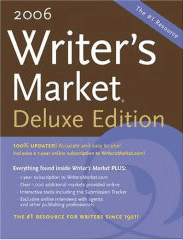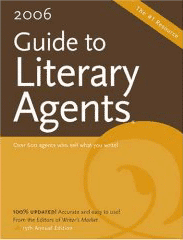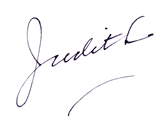

Ever since my first novel, Sins, was published, the following are questions I’ve been asked most. So I’ll try to answer them in the easiest way possible, through a Question and Answer format. Ready? Here goes:
- I’ve always wanted to write and I know I have a book in me. How do I get published?To quote Liz Smith when she wrote a column about “Judith Gould”: “...so applying the seats of their pants to the seats of their chairs, Nick and Rhea...” ( Note: If you’ve clicked on only this section of the menu you might need to click on The Story of Judith Gould to fully understand who she was talking about). Yes, me—Judith. Or should I say, we—Judith? In other words, you’ll never get a book published if you don’t write and keep writing. It’s like the professional pianist who practices each and every day. The more you write, the better your writing shall be.

 Reputable Sources are the Literary Market Place (LMP) or
Reputable Sources are the Literary Market Place (LMP) or
the above Writer’s Market ProductsBone up on your genre. That means, if you want to write (and publish) historical novels, read them. Refer to them if you have to, or need to be inspired. I’m not saying you should copy them. But you should definitely write in the required flavor. A novel taking place in contemporary times requires a different writing style than, say, an historical novel. Also, start thinking of words as colors. Just as an artist has a palette of paints to choose from, you have thousands and thousands of words. And those words have to make up a story. Or, in publishing parlance, if you’ll pardon the expression—a product. - But I’ve already written the book. Should I just send it to publishers, or should I get an agent instead?There are two sayings in publishing: (1.) “How do I get published? By having been published.” (2.) “How do I get an agent? By having been published.” There you have it—the classic “Catch-22.” Of course, every now and then there are exceptions, but believe you me, they are rare. In fact, breaking into publishing reminds me more of aspiring actors auditioning for parts than anything else. There are so many actors. And so few parts. I’m not trying to discourage you, but you’ve got to understand the realities you’re going to be facing.Now then. Say you have finished a novel, or at least have an outline and the first 100 pages completed. You are ready to submit your material. The question now is: to whom? Well, there are two schools of thoughts. Some writers will tell you to send them directly to a publisher, what is called submitting something “over the transom.” Personally, I don’t recommend that method. Agents are there as a first line of defense—to weed out what they believe will be rejected outright, or accepted by a publisher to at least be read by some junior editor. And even trying to get your material to an agent, requires you to follow a certain etiquette.First, you must choose the agent or literary agency that’s right for you.
- How do I even begin to look for one?Go to your local library. Most agents are reputable, or they wouldn’t stay in business. Almost every library’s Reference Section has a big book called Literary Marketplace (or LMP for short). Unfortunately, the last edition published seems to have been in 2002 (but you can buy a used copy on www.amazon.com from $34.95. It is still one of the most useful tools on the market for selling books and finding agents and publishers. In it, you will find endless lists of literary agents in the United States. In addition, the 2006 Writer’s Market and 2006 Guide to Literary Agents are available in libraries, at on-line booksellers, and at book stores.First, seek out the agents which represent the type of book you are trying to get published. Some agents specialize in romance, others in science fiction, still others in non-fiction, and others yet in high-brow literary works. You’ll find tons of them all over the country; make a list of their names and addresses. There. You’ve begun the process.
- How do I approach the agent or agency? Do I send them my material?No. What you send them is only a friendly, professional query letter, explain (in a nutshell) what you’ve been working on, and perhaps add a small paragraph describing the plot, etc. Ask if they are interested in seeing chapters and an outline. Some of them will respond (and this requires patience on your part) in due time that yes, they would like to see a chapter or more. If so, that’s when you send them what they are interested in seeing. Don’t send more than they wish to see. It is a long process and you are likely to encounter a lot of rejection, which means sending queries to other agents.
- Is there anything I should be beware of? Do I need to copyright my material before I send it?Any agent in the LMP or the WRITER’S MARKET is going to be legitimate. However, some of them charge “reading” fees and such. STAY AWAY FROM THOSE. The best agents never charge a reading fee. In the beginning, I would also send query letters only to agents in New York City. They are the closest (and have the closest relationships) to most of the publishers; New York City is the publishing capital of the United States.No reputable agent or publisher is going to “steal” your work. When a work is published is when it is copyrighted, and the publisher sees to that. I find it both hilarious and sad when a new author slaps a copyright symbol and date on unpublished material—copyrighting something is a bit more complicated than that. It means filing the material in the Library of Congress. I can’t think of a better way to show that you don’t know what you’re doing than pretending something has been copyrighted, when it really hasn’t been. It’s thoroughly unprofessional.
- Writing is a lonely profession. Does it have to be? And can I get help from anybody to help guide the way through this labyrinth of agents and publishers? Even football teams have managers of some sort, and cheerleaders.Luckily, depending upon the type of book you are working on, especially if it fits into the genre of popular novels, there are various organizations you can join that can be very helpful. For example, there’s the Romance Writers of America, the Mystery Writers, etc. All these have memberships for unpublished writers, and hold conferences and conventions and such where you can get to meet editors and agents, and other writers, both published and unpublished. I really don’t know the success rate unpublished writers have at these events, but I have heard that people can get agents and editors interested in their works during these meets. They have workshops that can be helpful, also. But whatever you do, never, ever, get suckered into paying to have a book published. There are “vanity presses” that specialize in preying on desperate authors, and the books never get anywhere.Knowing a published writer doesn’t hurt, not if you have the talent or the ability to have a handle on the market. As far as “Judith Gould’s” beginnings went, we lucked out. Rhea happened to know a published writer in Manhattan, where we lived for some 30 years, and he gave us his agent’s name. We contacted her, and she didn’t like what we’d done at all—but she did like our writing. She was interested in what else we had in mind. Well, that was one of the best rejections we could ever have had, since the something else happened to be Sins, our first published novel which turned out to become an international bestseller.That aside, let me reiterate: all the agents I’ve ever known who are listed in the LMP and other sources such as Writer’s Market are good and reputable. But you must be persistent with query letters and NOT GIVE UP. Bear in mind that agents (and editors) are overwhelmed with material. So put on your thickest skin, don’t take rejection personally (you might even get some good advice in the process), and wait to see what happens. As it is, my agent won’t even permit me to give out his name to our friends, he’s so swamped! So when friends ask “Judith” to put in a good word for them, I have to give them the exact same information I’ve just given you.I really do hope this has been helpful to you aspiring writers, and wish you the very best of luck in what is, below the surface, a very, very tough business. And getting tougher every year.
With best wishes and luck to you all,

Home | Judith’s Latest: Sneak Previews | All About Greek Winds of Fury | All About Dreamboat Judith’s Books | The Story of Judith Gould | What’s in the Works | Inspiration for Plots Advice to Writers | Recipes and Reviews | How to Find Out-of-Print Books | Photo Album Foreign Editions | Guestbook
©2026 Judith Gould